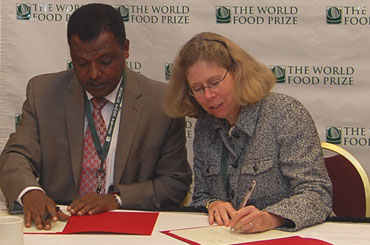Ames, Iowa, USA
March 15, 2011
A three-way international agreement between the European Union, a trade group representing eastern and southern Africa, and Iowa State University’s Seed Science Center has laid the groundwork to steer seed policy in the African region.
The African trade organization, Common Market for Eastern and Southern Africa (COMESA), received a grant from the EU to harmonize seed policies and regulations within the 19 countries that comprise the group and also between the group members and outside trade partners.
COMESA and the African Seed Trade Association representatives then asked ISU’s Seed Science Center to head the seed policy project.
A formal signing ceremony for the agreement was held last fall in conjunction with the World Food Prize events in Des Moines between Wendy Wintersteen, dean of ISU’s College of Agriculture and Life Sciences; and Getachew Belay, senior biotechnology advisor for the Alliance for Commodity Trade in Eastern and Southern Africa, a division of COMESA.

Belay, COMESA senior biotechnology policy advisor, and Wendy Wintersteen, endowed dean
of College of Agriculture and Life Sciences, sign a memorandum of agreement during the 2010 World Food Prize.
Harmonizing policies allows countries with comparable geography, climate and soil to adapt similar seed policy regulations. This allows the countries to trade more freely among themselves, and also foreign countries and companies to more easily import and export into the region.
“Harmonization is a good concept,” said Manjit Misra, director of the Seed Science Center. “When you harmonize, good things happen. You are getting the product into the region, and these countries need to have better seed. That leads to collaboration and trade within the region and across different regions, getting trade moving.”
While there are several advantages to harmonizing seed trade policies, there are still barriers. Political interests and social and cultural traditions can slow down the process.
“We add science to the process,” Misra added. “When countries are deciding policies, we can help them with our experience and knowledge.”
For instance, before importing certain seed varieties, governments want to know if importing seed will introduce diseases to the country. The Seed Science Center can answer these phytosanitary – or seed safety – questions.
The countries also have different documentation procedures that can slow down imports for years, said Misra. This “patchwork” system keeps the latest seed varieties from getting into the hands of producers when they need them most.
Different countries may also have different seed certification standards on imports.
“We think this agreement is a very major breakthrough,” said Misra. “The ultimate outcome is that trade within the region is going to expand. Products will move more easily from country to country and will also move into the region from different parts of the world.”
COMESA member countries are Burundi, Comoros, Democratic Republic of Congo, Djibouti, Egypt, Eritrea, Ethiopia, Kenya, Libya, Madagascar, Malawi, Mauritius, Rwanda, Seychelles, Sudan, Swaziland, Uganda, Zambia and Zimbabwe.
The Seed Science Center has headed similar efforts for other common markets in Africa. The center continues to work with the Southern African Development Communities (SADC) to harmonize the seed regulation in that area of the continent, and also in West Africa with an organization called the Economic Community of West African States (ECOWAS).
The Seed Science Center at Iowa State University houses the largest comprehensive public seed laboratory in the world. In the past 12 years, the center's Global Seed Program has conducted international projects on seed policy and regulations in more than 70 countries around the world. Currently the program has ongoing projects in 30 countries. For more information about the Seed Science Center at Iowa State University, visit www.seeds.iastate.edu.